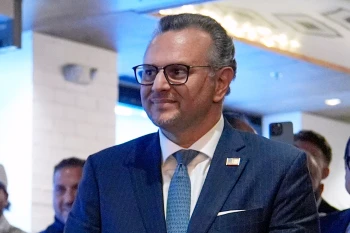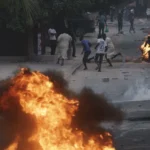In recent months, the United States has embarked on a diplomatic mission to secure a minerals deal with the Democratic Republic of the Congo (DRC), a country rich in vital resources. The DRC is home to significant reserves of minerals essential for modern technology, including cobalt, copper, and lithium. As electric vehicles and renewable energy technologies rise in demand, the need for these minerals has become increasingly crucial.
A Trump administration official, speaking under conditions of anonymity, revealed that negotiations are underway to address the DRC’s mineral wealth, which has often been shadowed by conflict and mismanagement. The DRC is the world’s largest producer of cobalt, an essential component in lithium-ion batteries, a crucial element in the global drive toward cleaner energy solutions. The U.S. aims to ensure a stable supply chain for these minerals while promoting ethical sourcing practices that could alleviate some of the ongoing humanitarian crises in the region.
The backdrop of these negotiations is laden with complexities. The DRC has been plagued by decades of civil unrest, which has been fueled by competition for its vast natural resources. Artisanal mining operations often operate in dangerous conditions and are linked to human rights abuses, including forced labor and exploitation. The U.S. is keenly aware that a minerals deal must not only focus on access to resources but also promote sustainable development and ethical practices.
The Biden administration’s approach aligns with an increasing emphasis on corporate transparency and responsible sourcing. In 2010, the Dodd-Frank Act was enacted in response to concerns about conflict minerals. It requires U.S. companies sourcing minerals to disclose their supply chains to prevent funding violence in conflict regions. This legislation has created a framework for future negotiations, highlighting the importance of responsible mineral extraction that does not exacerbate the existing crises in the DRC.
The U.S. and its allies are not the only global players eyeing the DRC’s mineral wealth. China has made significant inroads, securing multiple mining contracts and investments in infrastructure development across the country. In response, the U.S. has recognized that establishing strong partnerships with the DRC could counterbalance China’s growing influence while simultaneously addressing sustainability concerns. The need to exchange technical expertise and investment in local capacity building is fundamental to ensuring mutual benefits.
The U.S. is also considering involving various stakeholders, including local governments, non-governmental organizations, and international entities, to create a comprehensive framework for the minerals deal. This collaborative approach could offer a model for establishing best practices and ensuring that local communities benefit from the extraction of their resources, rather than suffer the consequences of exploitative practices.
However, achieving a successful minerals deal with the DRC goes beyond mere economic interests. It requires a commitment to human rights, transparency, and environmental sustainability. The U.S. has an opportunity not only to secure strategic minerals but also to solidify its position as a leader in promoting ethical practices in the global supply chain.
In conclusion, as the U.S. negotiates its minerals deal with the DRC, it stands at a crucial crossroads. By addressing the multifaceted challenges of mining in a conflict-ridden region, the U.S. could help facilitate a transformative partnership that not only secures essential resources but also fosters long-term stability and prosperity in the DRC. In doing so, it would lay the groundwork for a new era of diplomatic relations, grounded in ethical sourcing and mutual benefit.
Email Us on editorial@nnafrica.com













